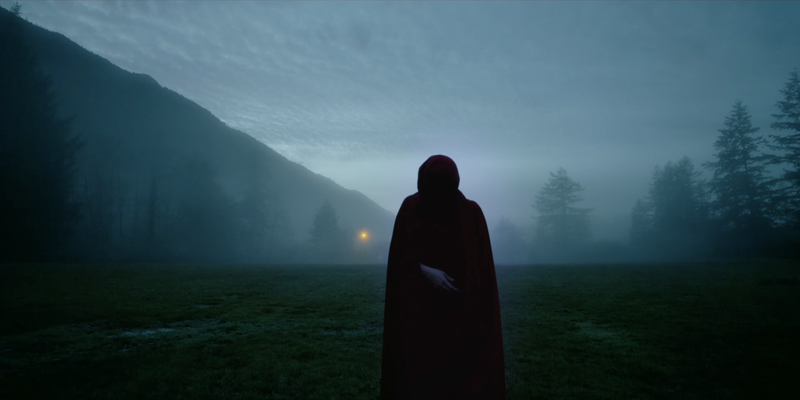
Intriguing Visuals, Elusive Motivations
Lyla
MOVIE REVIEW
Lyla
-
Genre: Thriller
Year Released: 2023, Miracle Media 2025
Runtime: 1h 22m
Director(s): Gordon Cowie
Writer(s): Gordon Cowie
Cast: Clark Moore, Jolene Andersen, Mason Wells, Aion Boyd, Chloe Farnworth, Joseph Lopez, Christopher Studenka, Houston Towe, Maria Olsen
Where to Watch: Available on digital April 21, 2025
RAVING REVIEW: When seeking refuge in isolation to boost creativity, the last thing one expects is a spiraling descent into paranoia and confusion, yet that's precisely what LYLA delivers. Gordon Cowie's directorial debut introduces audiences to Hugh (Clark Moore), an aspiring author intent on finishing his novel by retreating to a remote spot with his wife Lyla (Jolene Andersen) and their son Lars (Mason Wells). Predictably, what starts as a peaceful writing retreat quickly devolves into a maze of disturbing encounters and blurred realities, challenging perceptions of sanity and trust.
The film’s strongest asset undoubtedly lies in Cowie's dual roles as director and cinematographer. Each shot is meticulously composed, employing a vivid and often unsettling palette that heightens the film’s atmosphere. A memorable scene involving an incident on a seemingly tranquil beach showcases Cowie's eye for compelling visual storytelling. Such moments hint at considerable potential for future projects, showcasing a natural talent for setting mood and tone.
However, the film's narrative is where the promise falters. Cowie opts for a fragmented, non-linear approach, designed to reflect Hugh’s increasingly fragile psychological state. While conceptually interesting, this method serves more to confuse than captivate. Scenes shift abruptly, leaving viewers disoriented rather than connected to Hugh’s plight. Rather than fostering suspense or intrigue, the frequent jumps and abstract sequences disconnect the audience, detracting from the intended emotional impact.
This disconnection is compounded by vague character development. Andersen’s portrayal of Lyla oscillates intriguingly between affectionate and foreboding, but without a sufficient backstory or clearer motives, her complexity feels superficial and enigmatic for the sake of enigma. Moore’s performance as Hugh portrays his psychological collapse, but without grounding his paranoia in more defined events or interactions, the portrayal lacks emotional depth. A greater exploration of their histories or clearer indicators of their motivations could have significantly enhanced the viewer’s ability to engage meaningfully with the unfolding drama.
Another critical area for improvement lies in the sound design. Intended to parallel the characters’ internal turmoil, the jarring audio often crosses the threshold from immersive to intrusive. Instead of enhancing tension, it occasionally overwhelms scenes, undermining the carefully crafted aesthetics.
Thematically, LYLA addresses weighty subjects such as the fragility of mental health, trust within relationships, and the elusive nature of reality. The persistent ambiguity and fragmented storytelling obscure these potentially compelling themes, preventing them from resonating deeply with the audience. Ambiguity, when done well, invites contemplation and interpretation; however, excessive use can alienate viewers, leaving them frustrated rather than intrigued.
Yet, despite its shortcomings, LYLA reveals genuine promise, particularly through Cowie’s evident passion and cinematographic expertise. His visual storytelling abilities suggest the potential to create genuinely compelling psychological dramas in the future, provided he is given more polished scripts and refined narrative structures. With additional experience and a focus on balancing abstract storytelling with coherent narrative progressions, Cowie could indeed make a significant mark in psychological cinema.
In the end, LYLA emerges as a commendably ambitious but ultimately flawed exploration of psychological unraveling. It may appeal to viewers who appreciate unconventional storytelling and visual flair, but it is likely to frustrate those seeking straightforward narratives or emotionally satisfying resolutions. Still, its visual strengths alone may offer enough intrigue for some viewers, even as the film leaves them yearning for greater narrative clarity and emotional depth.
Please visit https://linktr.ee/overlyhonestr for more reviews.
You can follow me on Letterboxd, Instagram, Twitter, and YouTube. My social media accounts can also be found on most platforms by searching for 'Overly Honest Reviews'.
I’m always happy to hear from my readers; please don't hesitate to say hello or send me any questions about movies.
[photo courtesy of MIRACLE MEDIA]
DISCLAIMER:
At Overly Honest Movie Reviews, we value honesty and transparency. Occasionally, we receive complimentary items for review, including DVDs, Blu-rays, CDs, Vinyl Records, Books, and more. We assure you that these arrangements do not influence our reviews, as we are committed to providing unbiased and sincere evaluations. We aim to help you make informed entertainment choices regardless of our relationship with distributors or producers.
Amazon Affiliate Links:
Additionally, this site contains Amazon affiliate links. If you purchase through these links, we may receive a commission. This affiliate arrangement does not affect our commitment to honest reviews and helps support our site. We appreciate your trust and support in navigating these links.